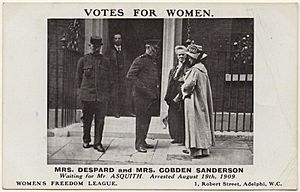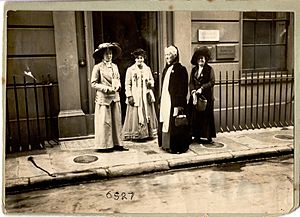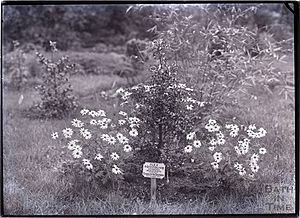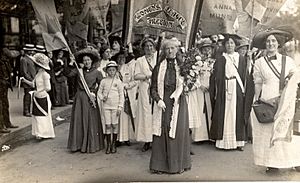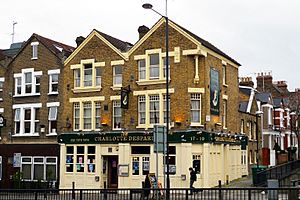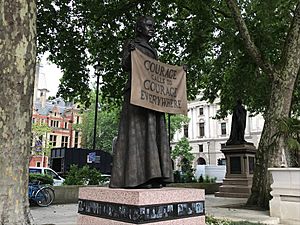Charlotte Despard facts for kids
Quick facts for kids
Charlotte Despard
|
|
|---|---|
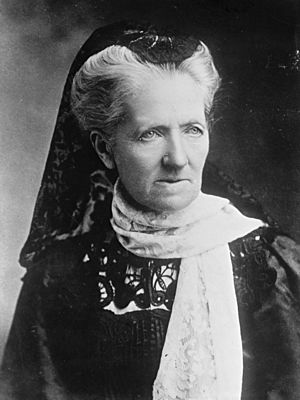
Despard, c. 1910
|
|
| Born |
Charlotte French
15 June 1844 Edinburgh, Scotland
|
| Died | 10 November 1939 (aged 95) Belfast, Northern Ireland
|
| Nationality | British |
| Known for | Activism in the suffragist, pacifist, Irish republican, and socialist movements; novels |
| Political party | Communist Party of Great Britain (CPGB) |
| Spouse(s) |
Maximilian Carden Despard
(m. 1870; died 1890) |
Charlotte Despard (born Charlotte French; 15 June 1844 – 10 November 1939) was an amazing Anglo-Irish woman who fought for many important causes. She was a suffragist (meaning she wanted women to have the right to vote), a socialist (believing in fairness for everyone), a pacifist (someone who is against war), and an activist for Sinn Féin (an Irish political party). She also wrote novels.
Charlotte Despard helped start several important groups, like the Women's Freedom League, the Women's Peace Crusade, and the Irish Women's Franchise League. She was also active in many other political groups throughout her long life. She was even sent to prison four times because of her work for women's voting rights. She kept fighting for women's rights, helping poor people, and promoting world peace even when she was in her 90s!
Contents
Early Life and Family
Charlotte French was born in Edinburgh, Scotland, on 15 June 1844. As a child, she lived in Scotland and later in England. Her father, Captain John Tracy William French, was in the Royal Navy. He died when Charlotte was young.
Charlotte was mostly taught at home by governesses. She felt her education wasn't very good. She was always a bit rebellious and even ran away from home at age 10! Her brother, Sir John French, became a famous military leader in World War I. This meant they were on opposite sides of many political issues later in life. One of her sisters, Katherine Harley, also worked for women's voting rights.
In 1870, Charlotte married Maximilian Carden Despard, a businessman. They traveled to places like Asia and India. Sadly, her husband died at sea in 1890. They did not have any children. After his death, Charlotte often wore black clothes for the rest of her life.
Writing Novels
Charlotte Despard wrote her first novel, Chaste as Ice, Pure as Snow, in 1874. Over the next 16 years, she wrote ten novels. Three of them were never published. One of her books, Outlawed: a Novel on the Women's Suffrage Question, was written with her friend Mabel Collins and came out in 1908.
Helping Others: Charity Work
After her husband passed away, Charlotte Despard was encouraged to do charity work. She was shocked by how poor many people were in London. This experience made her want to help even more. She spent her time and money helping poor people in an area called Battersea. She opened a health clinic, a soup kitchen for people who didn't have jobs, and clubs for young people and working men.
Charlotte even lived above one of her charity shops in a very poor part of Nine Elms. She also became a Roman Catholic. In 1894, she was elected as a Poor Law Guardian. This meant she helped manage aid for poor people in her local area until 1903.
Fighting for Change: Politics
Charlotte Despard became friends with Eleanor Marx, who was a famous socialist. Charlotte spoke out against the Boer War, calling it a "wicked war." She also traveled around the United Kingdom, speaking against forcing people to join the army during the First World War. She even started a group called the Women's Peace Crusade to oppose all wars.
Women's Right to Vote
Charlotte Despard was a strong supporter of women's right to vote, also known as women's suffrage. In 1906, she joined the National Union of Women's Suffrage Societies (NUWSS). She was sent to prison four times for her activism. She became frustrated with how slow the NUWSS was, so she joined a more radical group called the Women's Social and Political Union (WSPU). She became a well-known speaker for them. People described her as a "tireless and popular leader."
In 1907, Charlotte Despard and other women formed the Women's Freedom League (WFL). Their motto was Dare to be Free. They started this group because they disagreed with how the WSPU was being run. Charlotte was very brave. When she was in prison in 1911, she got angry when someone paid her fine, because she wanted to stay and protest!
Sylvia Pankhurst, another famous suffragette, was in prison with Charlotte in 1907. She said Charlotte had "truly magnificent courage." Charlotte was one of the imprisoned women who had a tree planted in her honor at Eagle House, a special place for suffragettes to rest.
Charlotte Despard also helped lead new ways of protesting, like women chaining themselves to gates. She was also part of a campaign called "No taxation without representation." This meant women refused to pay taxes because they didn't have a say in the government. Her furniture was often taken away to pay for these fines. She also led a big march called the Women's Coronation Procession in 1911.
In 1909, she met Mahatma Gandhi in London. She continued to work with other suffragists, and in 1928, she celebrated when the Equal Franchise Bill was passed. This law finally gave all women the right to vote in Britain.
Helping Refugees
From 1912 to 1921, Charlotte Despard worked with Kate Harvey and others to help people. During World War I, they turned Kate Harvey's house into a hospital. It was first meant for wounded soldiers, but it ended up helping refugee women and children instead. They also bought land and started an Open Air School for children.
Later Life and Beliefs
Unlike her brother, Charlotte Despard remained a pacifist during World War I. She refused to help with the British Army's recruitment. Her brother, Field Marshal John French, was a top commander in the army, which showed how different their views were.
She was an active member of the Labour Party in Battersea. In 1918, at age 74, she ran for election to Parliament. However, her anti-war views were not popular, and she lost.
Charlotte Despard was also a vegetarian and believed in animal rights. She was against testing on animals. She supported the Save the Children charity and the movement for India to become independent from British rule.
Activism in Ireland and Communism
In 1908, Charlotte Despard helped form the Irish Women's Franchise League in Dublin. She encouraged people to boycott the 1911 Census and not pay taxes. She also gave money to support workers during a big strike in Dublin in 1913.
After World War I, she moved to Dublin. She supported Éamon de Valera, an important Irish leader. She was very critical of her brother, who was now a Field Marshal. However, they later made up.
During the Irish War of Independence, she helped create the Women's Prisoners' Defence League. This group supported Irish republican prisoners. Because she was against the Anglo-Irish Treaty, the Irish government sometimes raided her house.
In 1930, Despard visited the Soviet Union to see how workers lived there. She was impressed and joined the Communist Party of Great Britain. She also became the secretary of a group called the Friends of Soviet Russia. In 1933, her house in Dublin was burned down by people who were against communism.
Charlotte Despard remained very active in politics even in her 80s and 90s. She gave speeches against fascism in places like Trafalgar Square. She was the guest of honor at a Women's Freedom League celebration for her 89th birthday. People said she still had "youthful vigour" and "clearness of vision." In her speech, she said a lot had been achieved for women, but they still needed more equality. She spoke out against poverty and hatred.
She died at the age of 95 in November 1939, after a fall at her new house in Whitehead, near Belfast. She was buried in the Republican Plot at Glasnevin Cemetery in Dublin.
Legacy
After her death, people remembered Charlotte Despard as someone who showed how strong and determined women could be when they believed in a great cause for humanity. Sylvia Pankhurst called her "one of our most courageous and devoted social workers."
In London, two streets are named after her, one in Battersea and another in Archway. There is also a pub called the Charlotte Despard in Archway, named in her honor.
Her name and picture are also on the base of the statue of Millicent Fawcett in Parliament Square, London. This statue honors a leader of the women's suffrage movement.
Images for kids
See also
 In Spanish: Charlotte Despard para niños
In Spanish: Charlotte Despard para niños
 | Bayard Rustin |
 | Jeannette Carter |
 | Jeremiah A. Brown |


